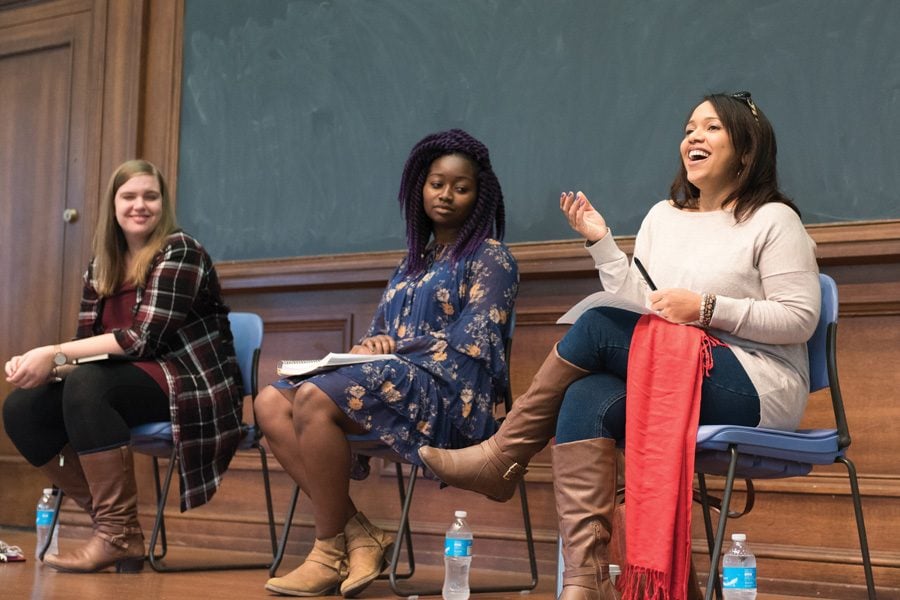Waa-Mu panel discusses need for casting actors of color in non-stereotypical roles
Lauren Duquette/Daily Senior Staffer
Adhana Reid (center) and theater prof. Melissa Foster (right) speak during a panel on diversity and inclusion in the Waa-Mu show at Harris Hall last month. The panelists said theater productions on campus should cast actors of color in non-stereotypical roles and represent the American population more accurately.
October 9, 2016
Students and a professor said Northwestern theater productions need to cast actors of color in non-stereotypical roles during a panel Sunday sponsored by the Waa-Mu Show, arguing productions should represent the American population more accurately.
Communication senior and theater major Adhana Reid spoke about her experience growing up watching plays, movies and television shows in which black women were typecast as the sidekick or the “sassy black girl.”
Reid, who performed in the last two Waa-Mu shows — “Gold” and “Another Way West” — said she has experienced microaggressions while working on these projects. In “Gold,” for example, Reid said she felt disconcerted when her character and the only other black character in the show sang a duet gospel song, even though all other songs in the show were contemporary music.
Reid said she spoke to members of the Waa-Mu community about her distress singing the gospel song, saying she felt stereotyped.
“I thought I was heard, and I was made to feel like I was heard,” she said. “But they were placating me and making me think that things were better, and nothing really changed.”
Reid said being one of the “few black theater majors here” has always made her question the reasons why she’s cast in roles, saying she sometimes worries she receives parts because of her race.
During the panel, some of the roughly 20 students in attendance said Waa-Mu needs to speak with members of the Virginia Wadsworth Wirtz Center for the Performing Arts — the office that sponsors the show — about making the show more inclusive.
Communication junior Chamaya Moody, a Waa-Mu student outreach coordinator and panel moderator, told The Daily that students involved in Waa-Mu are concerned about the influence of the Wirtz Center’s donors. A lot of the funds for the show come from alumni sponsors, whom she said “tend to be wealthier and whiter than the rest of the school.”
Moody said she heard complaints from some students of color about their experience with Waa-Mu and in NU theater.
“We came to a consensus that there are things that we need to change in terms of tradition, in terms of who we want to see on stage, whose stories we want to hear told,” she told The Daily. “That experience should be for everyone and not just for (a small) group of people, specifically the group of people who pay the most money towards the institution.”
Theater Prof. Melissa Foster (Bienen ’96, ’01), head of the Musical Theatre Vocal Studies program, said diversity and inclusion efforts at NU have improved since her time here, but she believes there is still a lot to be done.
Foster said having diverse casts, stories and identities on stage can open people’s minds.
“The question is, can it get better fast enough?” she said.
Foster told the audience, mostly students in NU’s theater community, that making Waa-Mu more diverse will take patience because students will have to educate each other about their different experiences.
She said it will take a while before the full effects of students’ work are visible, but that shouldn’t discourage them.
“You’re laying an extremely crucial foundation for tomorrow,” she said. “You can come back for your 10-year reunion and weep in the audience at what you did.”
Email: [email protected]
Twitter: @marianaa_alfaro


